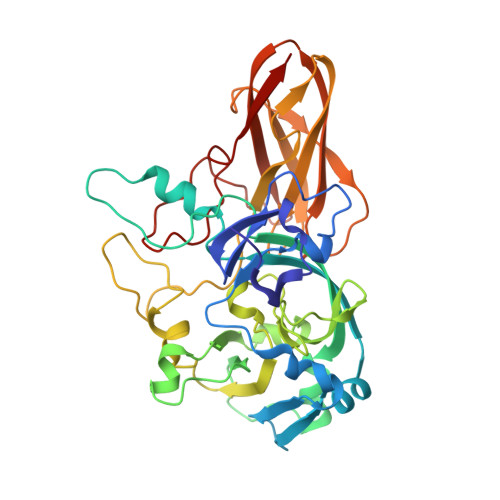The central active site arginine in sulfite oxidizing enzymes alters kinetic properties by controlling electron transfer and redox interactions.
Hsiao, J.C., McGrath, A.P., Kielmann, L., Kalimuthu, P., Darain, F., Bernhardt, P.V., Harmer, J., Lee, M., Meyers, K., Maher, M.J., Kappler, U.(2017) Biochim Biophys Acta 1859: 19-27
- PubMed: 28986298
- DOI: https://doi.org/10.1016/j.bbabio.2017.10.001
- Primary Citation of Related Structures:
5K3X, 5WA0 - PubMed Abstract:
A central conserved arginine, first identified as a clinical mutation leading to sulfite oxidase deficiency, is essential for catalytic competency of sulfite oxidizing molybdoenzymes, but the molecular basis for its effects on turnover and substrate affinity have not been fully elucidated. We have used a bacterial sulfite dehydrogenase, SorT, which lacks an internal heme group, but transfers electrons to an external, electron accepting cytochrome, SorU, to investigate the molecular functions of this arginine residue (Arg78). Assay of the SorT Mo centre catalytic competency in the absence of SorU showed that substitutions in the central arginine (R78Q, R78K and R78M mutations) only moderately altered SorT catalytic properties, except for R78M which caused significant reduction in SorT activity. The substitutions also altered the Mo-centre redox potentials (Mo VI/V potential lowered by ca. 60-80mV). However, all Arg78 mutations significantly impaired the ability of SorT to transfer electrons to SorU, where activities were reduced 17 to 46-fold compared to SorT WT , precluding determination of kinetic parameters. This was accompanied by the observation of conformational changes in both the introduced Gln and Lys residues in the crystal structure of the enzymes. Taking into account data collected by others on related SOE mutations we propose that the formation and maintenance of an electron transfer complex between the Mo centre and electron accepting heme groups is the main function of the central arginine, and that the reduced turnover and increases in K Msulfite are caused by the inefficient operation of the oxidative half reaction of the catalytic cycle in enzymes carrying these mutations.
- Centre for Metals in Biology, School of Chemistry and Molecular Biosciences, University of Queensland, St Lucia, QLD 4072, Australia.
Organizational Affiliation:

















